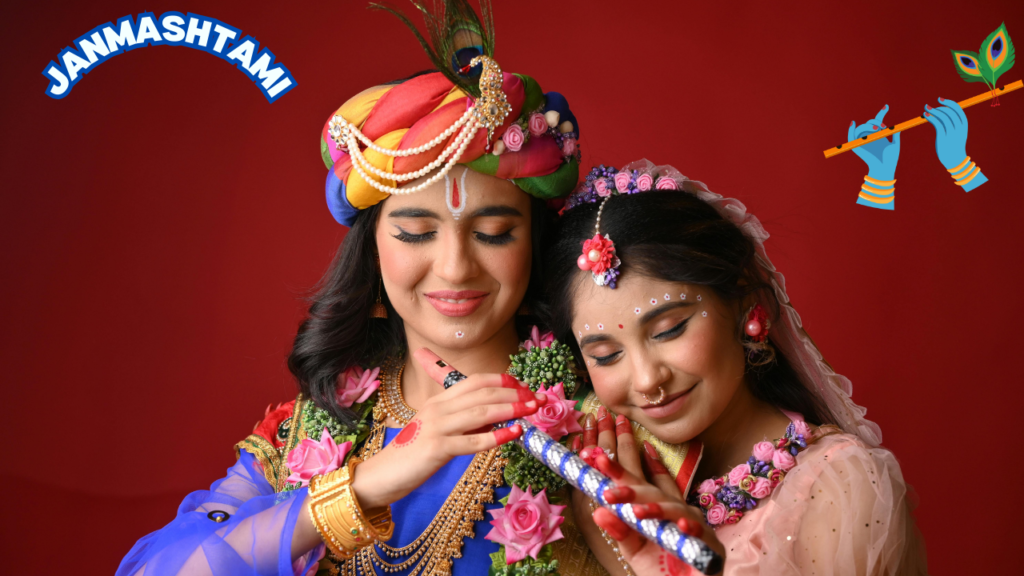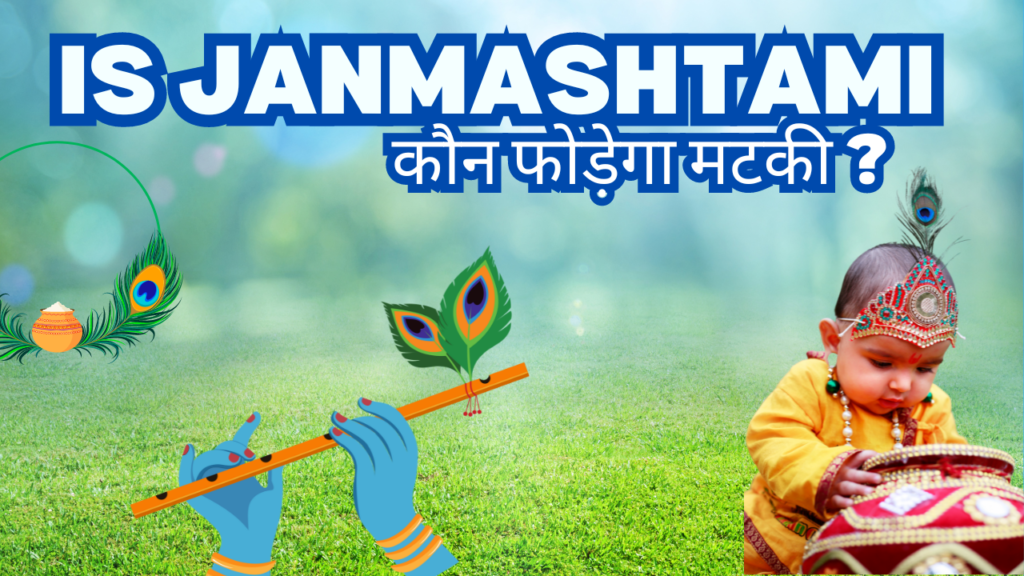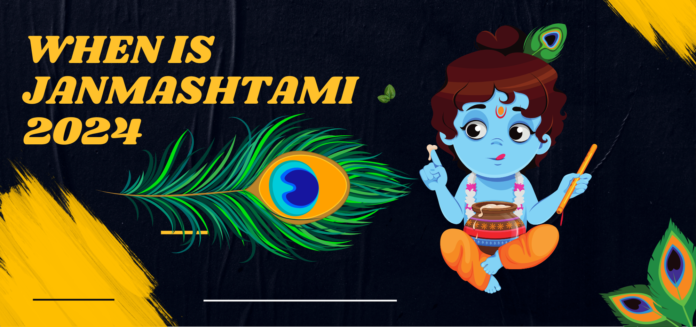Introduction
Janmashtami 2024, also known as Krishna Janmashtami or Gokulashtami, is a Hindu festival that celebrates the birth of Lord Krishna, one of the most revered deities in Hinduism. The festival holds great cultural and spiritual significance for millions of devotees around the world. In 2024, Janmashtami will be celebrated on August 26, marking this auspicious occasion with enthusiasm and devotion.
Lord Krishna, the eighth incarnation of Vishnu, is believed to have been born over 5,000 years ago in Mathura, India. His life and teachings are central to Hindu philosophy, and his birth is seen as a divine intervention to free the world from evil forces. Janmashtami is observed with immense devotion, prayers, fasting, and celebration in various regions of India and the world.
Historical Context of Janmashtami
The birth of Lord Krishna is described in ancient Hindu scriptures, primarily the Mahabharata and the Puranas, especially the Bhagavata Purana. According to Hindu belief, Krishna was born in a dungeon in the kingdom of Mathura at midnight on the Ashtami tithi of Krishna Paksha in the month of Bhadrapada (August-September).

The tyrannical king Kansa ruled Mathura, and it was prophesied that the eighth son of his sister Devaki would cause his death. Out of fear, Kansa imprisoned his sister and her husband Vasudeva. However, on the night of Krishna’s birth, divine forces helped Vasudeva to carry the newborn safely across the Yamuna river to Gokul, where Krishna was raised by his foster parents, Nanda and Yashoda.
Spiritual Significance of Janmashtami
Janmashtami 2024 is not just about celebrating Krishna’s birth, but also about remembering his teachings and his role in the epic Mahabharata, especially his discourses on the Bhagavad Gita, which is the spiritual foundation of Hinduism.
Krishna represents love, compassion, and divine wisdom. His playful yet intense nature is depicted through various stories from his childhood, such as stealing butter, dancing with gopis and lifting the Govardhan mountain to save his village from torrential rains. Devotees view Janmashtami as an opportunity to reflect on the ideals of dharma, karma and bhakti, which are symbolized by Krishna.
How is Janmashtami celebrated?
The celebration of Janmashtami 2024 varies considerably depending on region, tradition and personal preferences. However, there are some common practices that most devotees follow:
Fasting and prayer
Many devotees observe a fast (vrata) on Janmashtami, either abstaining from food completely or consuming only typical fasting foods such as fruits, milk and nuts. The fast is broken at midnight after Krishna’s symbolic birth. Devotees pray throughout the day, sing devotional songs (bhajans), read stories from the Bhagavad Gita and chant Krishna’s name.
Decorating temples and homes
Homes and temples are beautifully decorated with flowers, lights and rangoli (traditional Indian art made on the floor using colored powder or flowers). Small cradles (jhulas) representing baby Krishna are placed in homes and temples. Devotees prepare offerings of sweets, fruits and butter, which was Lord Krishna’s favorite.
Midnight Celebration
At midnight, the birth of Lord Krishna is celebrated with great enthusiasm. Temples reverberate with the sound of bells and conches. Idols of baby Krishna, often called “Laddu Gopal”, are bathed with milk, yogurt, honey and ghee in a Abhishek ceremony and then dressed in new clothes and jewelry.
Dahi Handi Tradition
One of the most famous traditions associated with Janmashtami 2024 is the Dahi Handi, which is especially popular in Maharashtra. The event symbolizes the playful and mischievous nature of young Krishna, who would steal butter from earthen pots hanging from the ceiling. During Dahi Handi, groups of young men form human pyramids to break a pot filled with curd, butter and sometimes money, which is suspended high above the ground. It is a lively and energetic event celebrated with great enthusiasm.

Raas Lila and Drama
In many parts of India, especially in Vrindavan and Mathura, dramatic reenactments of episodes from the life of Krishna are performed, known as Raas Lila. These dramas focus on Krishna’s divine playfulness, his love for Radha and his interactions with the gopis. Children often participate in these celebrations dressed as Krishna and Radha.
Janmashtami 2024 around the world
While Janmashtami 2024 is primarily celebrated in India, its significance extends to countries with large Hindu populations, including Nepal, Bangladesh, Fiji, Mauritius and Trinidad and Tobago. Additionally, the festival has gained popularity in other countries such as the United States, the United Kingdom and Canada, especially among Indian immigrants.
In the United States: Major celebrations are held at ISKCON (International Society for Krishna Consciousness) temples across the country, each with a special prayer meeting.
The story of Krishna’s birth
The story of Krishna’s birth is a tale of divine intervention, courage, and the victory of good over evil. According to the legend, Kansa, the evil king of Mathura, imprisoned his sister Devaki and her husband Vasudeva because of a prophecy that their eighth son would kill them. Despite Kansa’s efforts to prevent Krishna’s birth, divine forces ensured that Krishna was born safely and was taken to Gokul, where he was raised by Yashoda and Nanda.
This legend underscores the theme of divine will and protection, which is the main theme of the celebration of Janmashtami. Devotees believe that Krishna’s birth symbolizes the defeat of evil and the establishment of dharma in the world.
The Teachings of Lord Krishna
Krishna’s teachings are most famously recorded in the Bhagavad Gita, a 700-verse Hindu scripture that is part of the Mahabharata. The Gita is considered one of the most important spiritual texts not only in Hinduism but in religions around the world.
Krishna’s teachings cover a wide range of philosophical topics, including the nature of the soul, the importance of duty (karma), the path to spiritual liberation, and the importance of devotion. The teachings particularly focus on how a person should live a virtuous and balanced life, while remaining committed to his duties, detached from the consequences of karma.
Regional Variations in Celebrations
Janmashtami 2024 is celebrated differently across India, with each region adding its own unique customs and traditions:
In Mathura and Vrindavan: These cities are considered the hub of Janmashtami 2024 celebrations. In Mathura, the birthplace of Krishna, grand processions, temple decorations, and Raas Leela performances characterize the festivities. In Vrindavan, where Krishna spent his childhood, temples are beautifully decorated and pilgrims throng to witness the festivities.
In Maharashtra: Dahi Handi celebrations are a hallmark of Janmashtami 2024 in this region. It is a community event that attracts large crowds and participants, especially in cities like Mumbai.
In Gujarat: Gujarat, especially Dwarka (where Krishna is believed to have ruled as a king), celebrates Janmashtami with great reverence. Temples in Dwarka are decorated and the atmosphere is filled with devotional songs and dances.
In South India: In states like Tamil Nadu, Andhra Pradesh and Karnataka, devotees draw small footprints from the entrance of their homes to their prayer rooms, symbolizing the arrival of baby Krishna. Lavish feasts are prepared and homes are decorated with kolams (rangoli).
Modern-day celebrations and media influence
In recent years, media and technology have played a key role in popularizing Janmashtami celebrations. Live broadcasts of temple ceremonies, social media campaigns and virtual celebrations have made it easier for devotees from around the world to participate in the celebrations. ISKCON temples in particular have adopted digital platforms to connect with global audiences through live kirtans and interactive programmes.
Conclusion
Janmashtami 2024 is not just a religious festival; it is a celebration of faith, devotion and the eternal teachings of Lord Krishna. Whether through fasting, prayers or reenactments of Krishna’s playful pastimes, devotees find joy and spiritual fulfilment in celebrating the birth of their beloved deity. The festival is a reminder of the power of divine grace, the importance of righteousness and the eternal truth that good always triumphs over evil.
As you prepare to celebrate Janmashtami on August 26, 2024, may the blessings of Lord Krishna fill your life with love, happiness and spiritual enlightenment.
Shubh Muhurat and Time for Janmashtami 2024
Janmashtami 2024 is celebrated with great reverence, and the most important aspect of this festival is the timing of Lord Krishna’s birth, which took place at midnight on the Ashtami Tithi of Krishna Paksha of the Bhadrapada month. The timing is important for puja and rituals, and devotees follow specific Muhurats (auspicious times) for their prayers.
Janmashtami 2024 Date:
Date: August 26, 2024 (Monday)
Day: Ashtami Tithi begins and is celebrated on this Tithi.
Ashtami Tithi Timings (Eighth Lunar Day):
Ashtami Tithi Start: August 26, 2024, 10:28 am
Ashtami Tithi End: August 27, 2024, 12:30 pm
Nishita Kaal (Midnight Time) for Janmashtami Puja:
Nishita Kaal Puja Timings: August 26, 2024, 11:59 pm to 12:44 am (August 27, 2024)
Duration: 45 minutes
Nishita Kaal is considered to be the most auspicious time for Krishna Janmashtami Puja as Lord Krishna is believed to have been born at midnight. This is the time when most temples and devotees perform the most important rituals, which include abhishekam (ceremonial bath) of the idol of Lord Krishna and offerings of sweets, butter and fruits.
Rohini Nakshatra Timings (Nakshatra of Krishna’s Birth):
The Rohini Nakshatra is associated with the birth of Lord Krishna and is particularly auspicious during Janmashtami. The timing of Rohini Nakshatra enhances the significance of the celebration.
Rohini Nakshatra Start: August 26, 2024, 06:10 PM
Rohini Nakshatra End: August 27, 2024, 08:20 PM
The combination of Ashtami Tithi and Rohini Nakshatra is particularly favorable for performing Janmashtami rituals. Devotees who observe these auspicious times believe that their prayers will be particularly powerful and receive blessings from Lord Krishna.
Fast Breaking Time (Parana Time)
Devotees who observe a strict fast (fast) on Janmashtami generally break their fast only after the midnight puja. The fast breaking time (Parana) should be performed when both Ashtami Tithi and Rohini Nakshatra have passed.
Vrat opening time: August 27, 2024, after 12:30 pm, when the Ashtami tithi will end. These timings ensure that devotees offer their prayers at the most auspicious moment, increasing the spiritual significance of their Janmashtami celebrations.
Here are some common questions about Janmashtami 2024:
FAQs:
Here are some common questions about Janmashtami:
1. What is Janmashtami ?
Janmashtami is the annual Hindu festival celebrating the birth of Lord Krishna, the eighth incarnation of Vishnu.
2. When will Janmashtami be celebrated in 2024?
Janmashtami will be celebrated on August 26, 2024.
3. Why is Janmashtami celebrated?
Janmashtami commemorates the divine birth of Lord Krishna, who is believed to have taken birth to free the world from evil.
4. How is Janmashtami celebrated?
The festival is marked by fasting, singing devotional songs, performing dances (Raas Leela), and reenacting the life and stories of Krishna.
5. What is Dahi Handi?
Dahi Handi is a popular tradition during Janmashtami, where an earthen pot filled with yogurt is hung high, and teams form human pyramids to break it.
6. Where is Janmashtami most widely celebrated?
Janmashtami is celebrated across India, but the festival is celebrated with great pomp in Mathura, Vrindavan and Dwarka, which are closely associated with Lord Krishna.
7. What traditional dishes are made on Janmashtami?
Popular dishes include panjiri, kheer, peda, sweets made with butter and milk, as these were loved by Lord Krishna.



We absolutely love your blog and find a lot oof
your post’s to be precisely what I’m looking for. cann you offer guest writers to write content to suit
your needs? I wouldn’t mind publishing a post or elaborating on a few of the suubjects you write with
regards to here. Again, awesome website! https://Bandur-Art.Blogspot.com/2024/08/the-ultimate-guide-to-no-mans-sky-mods.html
We absolutely love your blog and find a lot of your post’s
to be precisely what I’m looking for. can you offer guewst writers to write content to suit your needs?
I wouldn’t mind publishing a post or elaborating on a few of the
subjects youu write with regards to here. Again,
awesome website! https://Bandur-Art.Blogspot.com/2024/08/the-ultimate-guide-to-no-mans-sky-mods.html